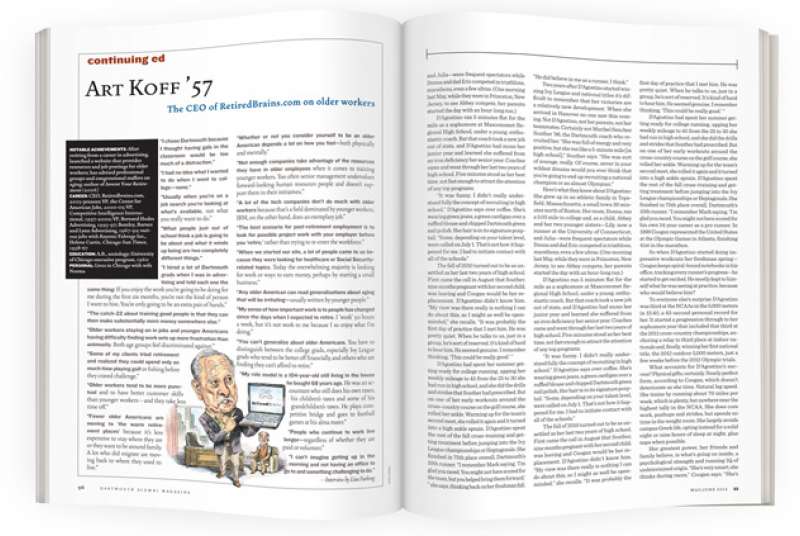
Art Koff ’57
Notable Achievements: After retiring from a career in advertising, launched a website that provides resources and job postings for older workers; has advised professional groups and congressional staffers on aging; author of Invent Your Retirement (2006)
Career: CEO, Retiredbrains.com, 2003-present; VP, the Center for American Jobs, 2000-03; VP, Competitive Intelligence International, 1997-2000; VP, Bernard Hodes Advertising, 1993-97; Bentley, Barnes and Lynn Advertising, 1967-92; various jobs with Rayette/Fabrege Inc., Helene Curtis, Chicago Sun Times, 1958-67
Education: A.B., sociology; University of Chicago executive program, 1960
Personal: Lives in Chicago with wife Norma
“I chose Dartmouth because I thought having gals in the classroom would be too much of a distraction.”
“I had no idea what I wanted to do when I went to college—none.”
“Usually when you’re on a job search you’re looking at what’s available, not what you really want to do.”
“What people just out of school think a job is going to be about and what it winds up being are two completely different things.”
“I hired a lot of Dartmouth grads when I was in advertising and told each one the same thing: If you enjoy the work you’re going to be doing for me during the first six months, you’re not the kind of person I want to hire. You’re only going to be an extra pair of hands.”
“The catch-22 about training good people is that they can then make substantially more money somewhere else.”
“Older workers staying on in jobs and younger Americans having difficulty finding work sets up more frustration than animosity. Both age groups feel discriminated against.”
“Some of my clients tried retirement and realized they could spend only so much time playing golf or fishing before they craved challenge.”
“Older workers tend to be more punctual and to have better customer skills than younger workers—and they take less time off.”
“Fewer older Americans are moving to ‘the warm retirement places’ because it’s less expensive to stay where they are or they want to be around family. A lot who did migrate are moving back to where they used to live.”
“Whether or not you consider yourself to be an older American depends a lot on how you feel—both physically and mentally.”
“Not enough companies take advantage of the resources they have in older employees when it comes to training younger workers. Too often senior management undervalues forward-looking human resources people and doesn’t support them in their initiatives.”
“A lot of the tech companies don’t do much with older workers because that’s a field dominated by younger workers. IBM, on the other hand, does an exemplary job.”
“The best scenario for post-retirement employment is to look for possible project work with your employer before you ‘retire,’ rather than trying to re-enter the workforce.”
“When we started our site, a lot of people came to us because they were looking for healthcare or Social Security-related topics. Today the overwhelming majority is looking for work or ways to earn money, perhaps by starting a small business.”
“Any older American can read generalizations about aging that will be irritating—usually written by younger people.”
“My sense of how important work is to people has changed since the days when I expected to retire. I ‘work’ 50 hours a week, but it’s not work to me because I so enjoy what I’m doing.”
“You can’t generalize about older Americans. You have to distinguish between the college grads, especially Ivy League grads who tend to be better off financially, and others who are finding they can’t afford to retire.”
“My role model is a 104-year-old still living in the house he bought 68 years ago. He was an accountant who still does his own taxes, his children’s taxes and some of his grandchildren’s taxes. He plays competitive bridge and goes to football games at his alma mater.”
“People who continue to work live longer—regardless of whether they are paid or volunteer.”
“I can’t imagine getting up in the morning and not having an office to go to and something challenging to do.”










